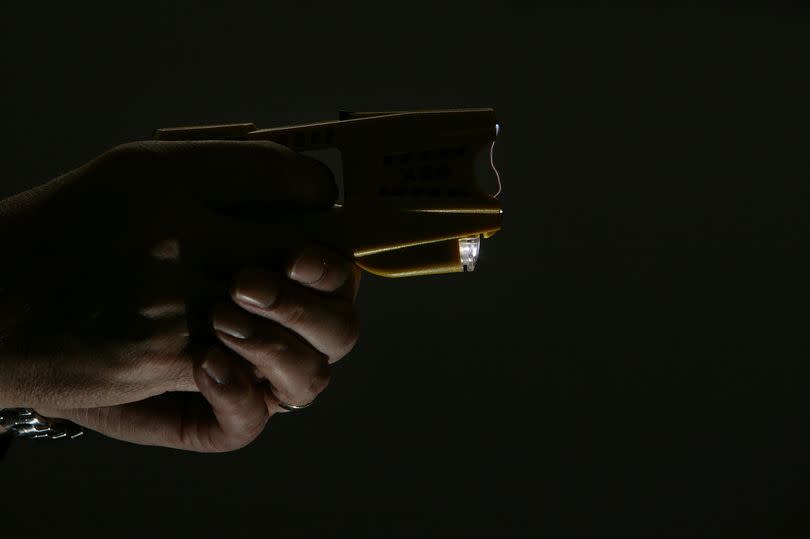Senior PSNI officer defends increased use of plastic bullets and tasers branded ‘deeply disturbing’ by human rights organisation

A senior PSNI officer has defended the increased use of force and items such as plastic bullets and tasers in the last year after a human rights organisation branded it "deeply disturbing".
Figures released by the PSNI on Friday showed that between 1 April 2023 and 31 March 2024, there had been an increase of more than 20% in the use of force by its officers.
There were 21,508 incidents involving the use of force by officers were recorded during that time, compared to 17,742 the year before - an increase of 21%.
READ MORE: East Belfast 'show of strength' being 'reviewed' by PSNI
READ MORE: PSNI officer forced to jump into hedge to avoid being struck by car, court hears
The majority of incidents recorded were known as "unarmed physical tactics" such as blocks/strikes and take downs, with these rising by a quarter in the space of a year.
However, the figures showed a rise in the firing of plastic bullets from four to nine, while the number of times a taser was fired rose from 15 to 21.
Patrick Corrigan, Northern Ireland Director of Amnesty International UK, said the figures were ‘deeply disturbing’ and that he would be raising his concerns with the Policing Board.
Assistant Chief Constable Melanie Jones of the PSNI’s Operational Support Department, says the rising use of force comes as a result of increasing attacks on its officers. Figures from the force suggest as many as eight officers per day are subject to assaults.
“The most common reason for our officers using force, as evidenced in this report, is to protect themselves during the course of their duty and safeguard the public from harm,” ACC Jones says.
“Policing is a job with great personal risk, which is shown by the rise in assaults on our officers and staff. Officers often step into the unknown, placing their lives at risk and working to protect others.
“We are increasingly being called upon to address calls for concern and safety in relation to vulnerable people. Our work around Right Care Right Person will help to ensure that the right agency is called to deal with people in need or crisis.
“It should also be noted that in the vast majority of cases where force is used, unarmed physical tactics are more regularly used when faced with a risk to life of the officer or a member of the public. Equipping officers with a range of techniques, including spit-and-bite guards and irritant spray, gives us the ability to effectively disrupt aggressors in challenging circumstances, using the least amount of force possible.”
The senior officer says that the use of plastic bullets (AEPs) and tasers (CEDs) is a last resort for officers responding to calls.
“However, when it is necessary and proportionate for an officer to use another tactic including Attenuating Energy Projectile (AEP), this is subject to careful scrutiny and accountability, both in response to incidents and during public safety scenarios.
“Incidents are reported to the Police Ombudsman for Northern Ireland with Use of Force incidents recorded and supplied to the Policing Board, the Police Service’s Service Accountability Panel (SAP) and available to the public.
"As a Police Service, we are determined to keep people safe in often difficult and dangerous situations and we invest in training and equipping our people to appropriate standards to be able to do this."
The biannual figures from the PSNI also showed an increased use of spit and bite guards, including some instances where they have been used on children under 12.
“There is much to be concerned about in this latest report on use of force by the PSNI,” Patrick Corrigan from amnesty says.
“The use of plastic bullets by the PSNI is at its highest rate of any time in the last decade, despite everything we know about their potentially lethal impact.
“The rapidly increasing use of spit hoods, including on children under the age of 12 and despite clear guidance that they should not be used on children, is deeply disturbing.
“Shockingly 6% of incidents or use of force were used on people from minoritised communities despite them making up just 3.4% of the population.
“The figures are even more stark on the use of force on Irish Travellers, with 8% of use of batons and 5% of use of police dogs, on Irish Travellers, despite them making up just 0.14% of the population.
“No information has been given regarding community background of those on whom force has been used.
“We will be raising our concerns with the Northern Ireland Policing Board.”
For all the latest news, visit the Belfast Live homepage here and sign up to our daily newsletter here.

 Yahoo News
Yahoo News 
